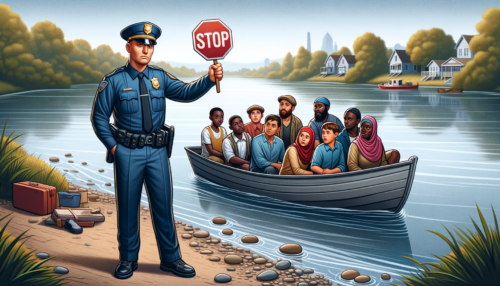Europe’s immigration landscape is a bit like a complex puzzle, where every piece seems to stir up a debate or two. Let’s dive into why many European nations are raising eyebrows over immigration, especially the illegal kind. Spoiler alert: it’s not just about border control; it’s also about the clash of cultures and the growing pains of integration.
First things first, where are these immigrants coming from? Many are fleeing conflict-ridden or economically unstable regions like Syria, Afghanistan, and some African countries. Their journey to Europe? Risky, often involving treacherous routes and dodgy crossings.
Now, onto integration, or rather, the lack thereof. European countries are juggling to integrate immigrants into their societies, and it’s turning out to be a tougher gig than expected. Language barriers, different cultures especially with a strong religious overtone, and economic woes are just the tip of the iceberg. The result? Immigrant communities often end up somewhat isolated, creating a cocktail of misunderstanding and tension between them and the locals.
Let’s take a closer look at how different European countries are dealing with this.
The European Union’s New Rules
The EU recently jazzed up its migration policy, introducing a system where member states can choose how to deal with immigrants – accept them, send them back, or chip in for operational support. It’s like a ‘pick your path’ game, but with real-life implications for thousands of people.
Germany’s Tough Stance
Germany, under Chancellor Olaf Scholz, is playing it tough with a new migration policy. They’re looking to make deportations easier and are exploring the idea of processing asylum applications outside the EU. It’s a clear signal that Germany’s open-door days are taking a back seat.
The UK’s Balancing Act and Suella Braverman
Post-Brexit UK is showing warmer vibes towards immigration, but it’s not all smooth sailing. The government is trying to balance the positives of immigration with the pressures it puts on housing, jobs, and public services.
And here is where Suella Braverman comes in. Who exactly is she and what has she said and done? Here is her short story, she is a child of immigrant parents when they immigrated to Britain in the 1960s. She rose to become British Home Secretary under Prime Minister Rishi Sunak.
Although ironic that she would be against immigration, she is brave enough to hold views that immigration should be a net positive to the host country, not a negative one knowing her views that she would get a lot of hate and might even be labeled as far-right by some.
In a recent and significant development today, British Home Secretary Suella Braverman has been dismissed from her position by Prime Minister Rishi Sunak. This decision followed Braverman’s contentious remarks regarding the police’s handling of pro-Palestinian protests in the UK. Her comments were seen as inflammatory and were accused of exacerbating tensions during a period of contentious pro-Palestinian protests and counter-protests in Britain.
Braverman had been a controversial figure throughout her tenure, known for her hardline stance on immigration and engagement in divisive cultural debates. She had vocally criticized her opponents, labeling them as the liberal “tofu-eating wokerati,” and expressed her strong support for the policy of sending asylum seekers to Rwanda, describing it as her “dream” and “obsession.”
Her dismissal came after she authored a newspaper article, seemingly without Prime Minister Sunak’s approval, in which she accused the police of bias towards left-wing causes. This article was seen as contributing to heightened tensions ahead of a weekend marked by protests over Israel’s actions in Gaza, which were met with violence from the other group of British counter-protesters. The resulting situation and the public backlash against her comments ultimately led to calls for her removal from office
We don’t know what her end goal is but it is safe to say it won’t be the last time we hear from Suella Braverman as she garnered major support from what some would describe as the silent majority.
And her views are resonating with many across the pond in the United States and Canada.
A Clash of Cultures Is Coming?
Here’s the thing: when immigrants don’t blend well with their host countries, it stirs up a hornet’s nest. Locals start feeling resentful, especially if they’re struggling themselves. It’s like the immigrants’ needs are hogging the spotlight, leaving the locals in the shadows. This is not just a European thing – it’s a global issue, touching countries like the U.S. and Canada too.
If European governments don’t start tuning into their citizens’ concerns, we might be looking at a major showdown. It’s a delicate dance of putting citizens first while not shutting the door on those in need. It’s about finding that sweet spot where everyone gets a fair shake, and no one feels left out in the cold. It’s not an easy fix, but it’s a conversation that’s long overdue.




